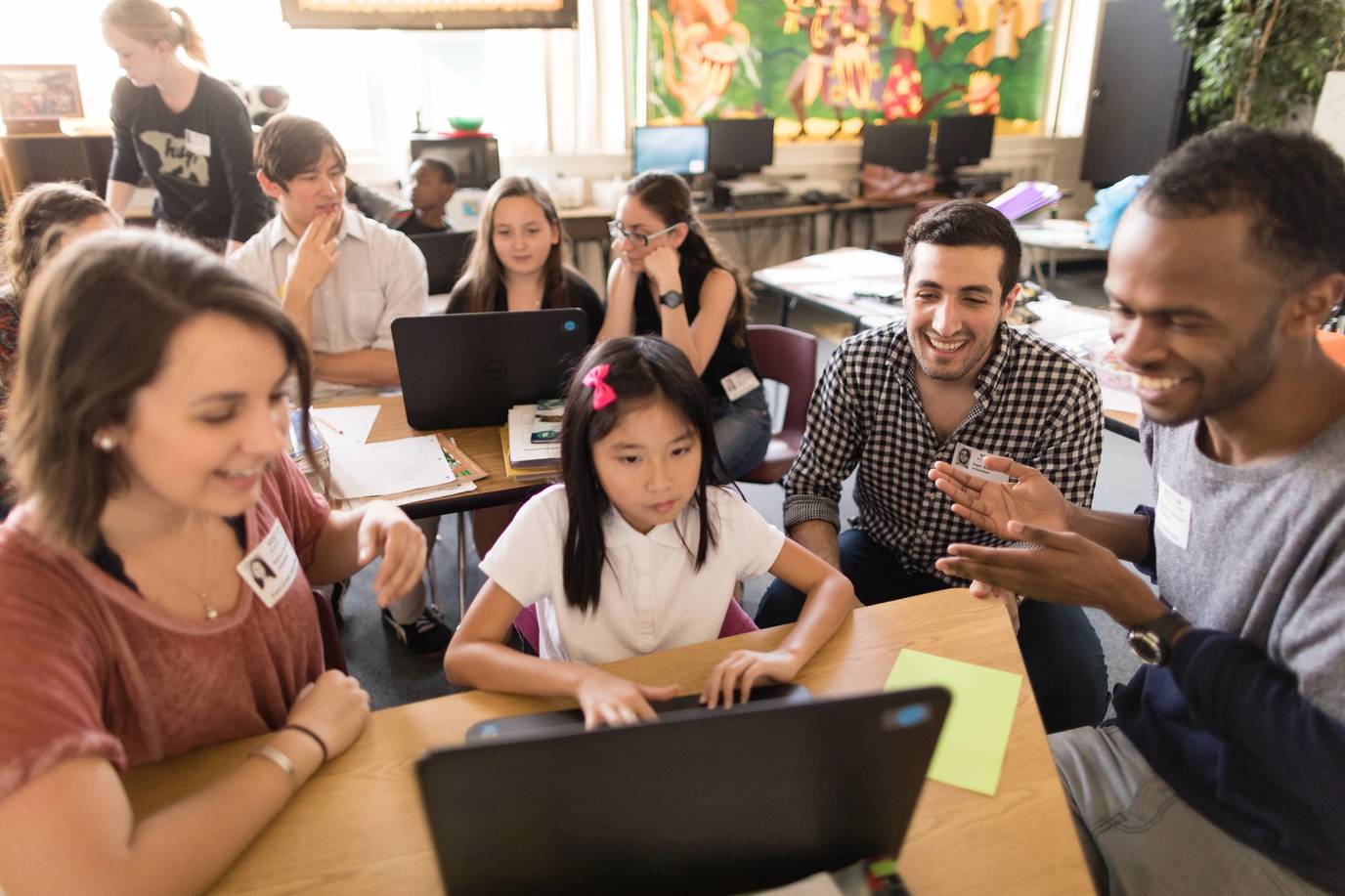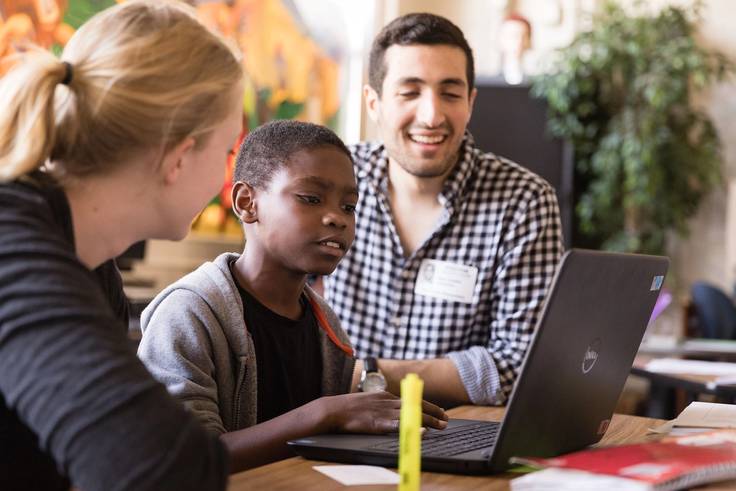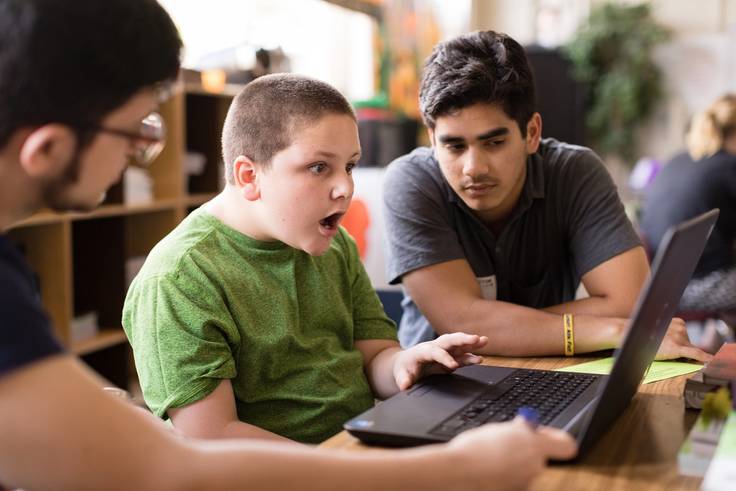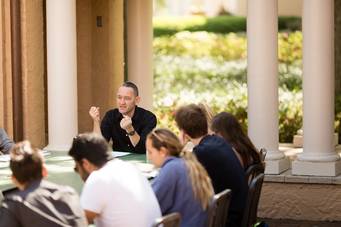Igniting Kids’ Imagination Through Computer Science
March 13, 2017
By Rob Humphreys ’16MBA

Rollins student and professor team up with Google on after-school project for fourth-graders.
Programming your electronic cat to walk toward cheesy puffs on a computer screen? Boring.
A magical wizard vaporizing those tasty treats instead? Awesome!
For Sam Sadeh ’18 and his fourth-grade mentees at Fern Creek Elementary School, success can be measured in the silliest of scenarios—like when kids go off script to let their imaginations run wild.
“The aha moment is when they take it miles beyond whatever I could have dreamed up in the lesson plan,” says Sadeh, a computer science major and social entrepreneurship minor. “The beauty of coding is the creative problem-solving, and these kids are definitely creative.”
This spring, as part of an $1,100 grant through Google’s igniteCS initiative, Sadeh and eight Rollins classmates have used MIT’s child-friendly Scratch software to teach the basics of coding to students in Fern Creek’s after-school program. IgniteCS, which helps college students make a difference in their communities through computer science mentorship, only funds about a dozen projects each year, nationwide.

Student-Faculty Collaboration
Sadeh’s advisor, assistant professor of computer science Dan Myers, helped him submit the proposal to Google and develop the curriculum. Apart from having Myers as a resource, Rollins’ program is run entirely by students. Most of them are from computer science backgrounds, but the group also includes students majoring in theater, international relations, and international business.
“This is a great example of the power of the educational model we have at Rollins,” Myers says. “We’re not just training students to write code or get a degree. We’re training them to be leaders and take projects all the way to completion.”
Taking igniteCS to Fern Creek—a Title 1, high-needs school—was the perfect way for Sadeh to synthesize academia with his passions: volunteering and helping young people learn. His life’s goal, he’s quick to mention, revolves around “using technology as a means to promote the spread of education.”
“What’s always struck me about Sam is his ability to get things done,” Myers says. “We have a lot of good programmers at Rollins and Sam certainly fits into that category, but he also has the ability to take a project and run with it; to turn it into something great.”

Up Next
When Google funds igniteCS projects, the goal is to ensure their sustainability. With that in mind, college students have virtual access to Google’s engineers and support team, and both sides collaborate to strategize about what works best.
Looking ahead, Myers and Sadeh are evaluating ways in which Rollins’ program can be continued for years to come. Ideas include rolling it into a general education course as a community engagement element or making it an activity through the campus chapter of the Association for Computing Machinery.
A pipeline of students is already in place to take the mantle when Sadeh graduates—and he knows they’ll be in good hands.
“What I respect so much about Dr. Myers is his passion for honing students’ talents,” says Sadeh, a Bonner Leader. “He gets to know students on an individual level and finds next steps for them to grow and move forward.”
“Many of the students I advise, when we first start talking it’s about career and academic orientation,” Myers adds. “But as we develop relationships, we start looking at how they can make a contribution regarding things that matter to them on a deeper individual level. IgniteCS certainly does that and more. It really encapsulates Rollins’ values of productive careers, meaningful lives, and responsible leadership.”
Rollins Students Participating in igniteCS
- Sam Sadeh, ’18, computer science (coordinator)
- Andee Atkins ’17, theater
- Julie Anna Contino ’17, computer science
- Nick L’Heureux ’17, computer science
- Alexandra DeLucia ’18, computer science and math
- Brandon Johnson ’18, computer science
- Jerry Abril ’19, computer science
- Karina Barbesino ’19, international relations and Asian studies
- Felix Ruiz ’19, international business

See for Yourself
Get a feel for Rollins’ unique brand of engaged learning and personalized attention through one of our virtual or in-person visit experiences.
Read More
March 20, 2024
Rollins’ External Relations Team Named Finalist for Prestigious PR Award
Rollins’ Office of Communications & External Relations earns a spot as an Anvil Award finalist for media coverage of valedictorian Elizabeth Bonker ’22.
March 19, 2024
Strom Publishes Book on History of Hunger Relief
History professor Claire Strom has co-written a new book on the national hunger relief movement alongside Dave Krepcho, president and CEO of Second Harvest Food Bank of Central Florida.
March 13, 2024
Small Classes, Big Impact
At Rollins, our commitment to small, discussion-based classes drives deeper learning and deeper connection.
